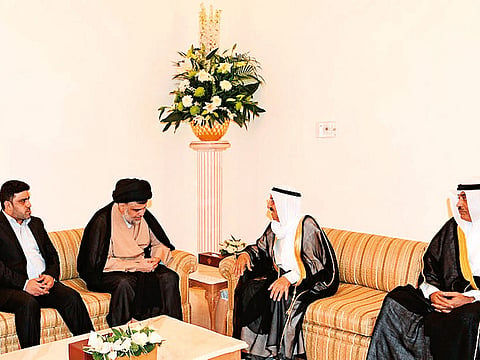Al Sadr pays surprise visit to Kuwait
Post-elections Iraq seeks better balance with neighbours

Manama: Kuwait’s Emir Shaikh Sabah Al Ahmad Al Sabah on Tuesday evening received Muqtada Al Sadr, the leader of the Iraqi Sadrist Movement, who made an announced visit to the northern Arabian Gulf state.
No details were provided by the Kuwaiti news agency about the talks between the Emir and Al Sadr whose Sairoon bloc won 54 seats in Iraq’s parliamentary elections on May 12, ahead of Al Hashd Al Shaabi-linked coalition, 47 seats, and Prime Minister Haidar Al Abadi’s Victory bloc, 42 seats.
Deputy Foreign Minister Khalid Al Jarallah said that Kuwait hopes that the brothers in Iraq will be able to form a new government as early as possible.
“The visit to Kuwait earlier today by Seyyed Muqtada Al Sadr, the leader of the Iraqi Sadrist Movement, provided a chance for reviewing the situation in Iraq in the wake of the general elections," Al Jarallah said at a "Ghabqa" (late Ramadan banquet) hosted by the foreign ministry for the heads of diplomatic missions.
“Sayyed Muqtada Al Sadr, a prominent politician, is always welcome in Kuwait and his visit came in response to an invitation from His Highness the Emir Shaikh Sabah Al Ahmad Al Jaber Al Sabah," Al Jarallah said, noting that the Emir received the Iraqi politician at Dasman Palace, Kuwait News Agency (Kuna) reported.
Al Sadr’s media office said in a statement that “the two sides exchanged good wishes on the holy month of Ramadan and reviewed the amicable and fraternal relations between the two neighbouring countries and people and ways to reinforce bonds and constructive cooperation that would contribute to consolidating stability and prosperity.”
According to the statement, Al Sadr briefed Shaikh Sabah on his vision to form the new government and stressed that it would be patriotic and would guarantee the rights of all components and minorities of all affiliations .
The parliamentary results do not allow Al Sadr to unilaterally form a government, but do give him the best possibility to play a key role in naming the next prime minister.
The visit is likely to be perceived as a strong message from Al Sadr to the Arab countries that Iraq, long accused of being an Iranian satellite, wants to regain its Arab dimension.
The visit can also be seen as a message to Iran that Iraq would change course and would steer away from the Iranian umbrella that has dominated the local scene since 2003.
On Tuesday, Al Sadr reiterated his rejection of any role by Iran or the US in the formation of the new government.
“Iran is a neighbouring country that has concerns about its interests and we hope it will not interfere in Iraqi affairs, just like we reject any interference in its own affairs,” Al Sadr said in a statement carried by his media office. “The US is an invader country and we do not allow it to interfere at all.”
Al Sadr visited Saudi Arabia in July last year, his first visit to the kingdom in 11 years. He visited the UAE in August to strengthen ties with Arab countries.
Sign up for the Daily Briefing
Get the latest news and updates straight to your inbox



